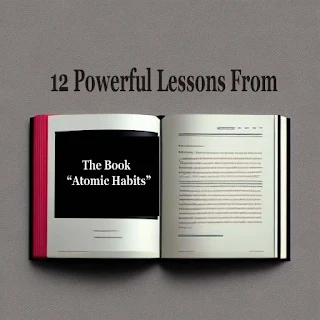12 powerful lessons from The Book “Atomic Habits”
- Habits are
the compound interest of self-improvement. Small changes, made consistently
over time, can lead to big results.
- To build
better habits, focus on systems, not goals. Goals are the outcome you want to achieve, but systems are
the processes that lead to the outcome.
- The four
stages of habit formation are cue, craving, response, and
reward. To change a habit, you need to understand and modify each stage.
- The two
most effective ways to change a habit are to make it obvious and attractive. For example,
if you want to exercise more, leave your running shoes by the door and find a
workout partner.
- Habits thrive
in a consistent environment. To make a habit stick, create a
consistent routine and eliminate any obstacles or distractions.
- The key to
creating good habits is to start small and build momentum over time. Make your
habits so easy that you can’t say no.
- To break a
bad habit, you need to identify and address the underlying cause of the
behavior. For example, if you eat unhealthy food when you’re stressed, find healthier ways to manage your stress.
- Habits are
reinforced by immediate rewards. To make a habit stick, give
yourself a small reward after completing
the behaviour.
- To overcome
procrastination, focus on the process, not the outcome. break down
the task into small, manageable steps and focus on taking action, not perfection.
- The power
of social norms can be used to your advantage. Surround yourself with people who
have the habits you want to adopt, and make your habits public to increase
accountability.
- The
power of identity is essential for
lasting behaviour change. Rather than focusing on what you want to achieve, focus
on who you want to become.
- The most
important factor for building better habits is to get started. Take
action today, even if it’s a small step, and use the power of
momentum to keep going.





